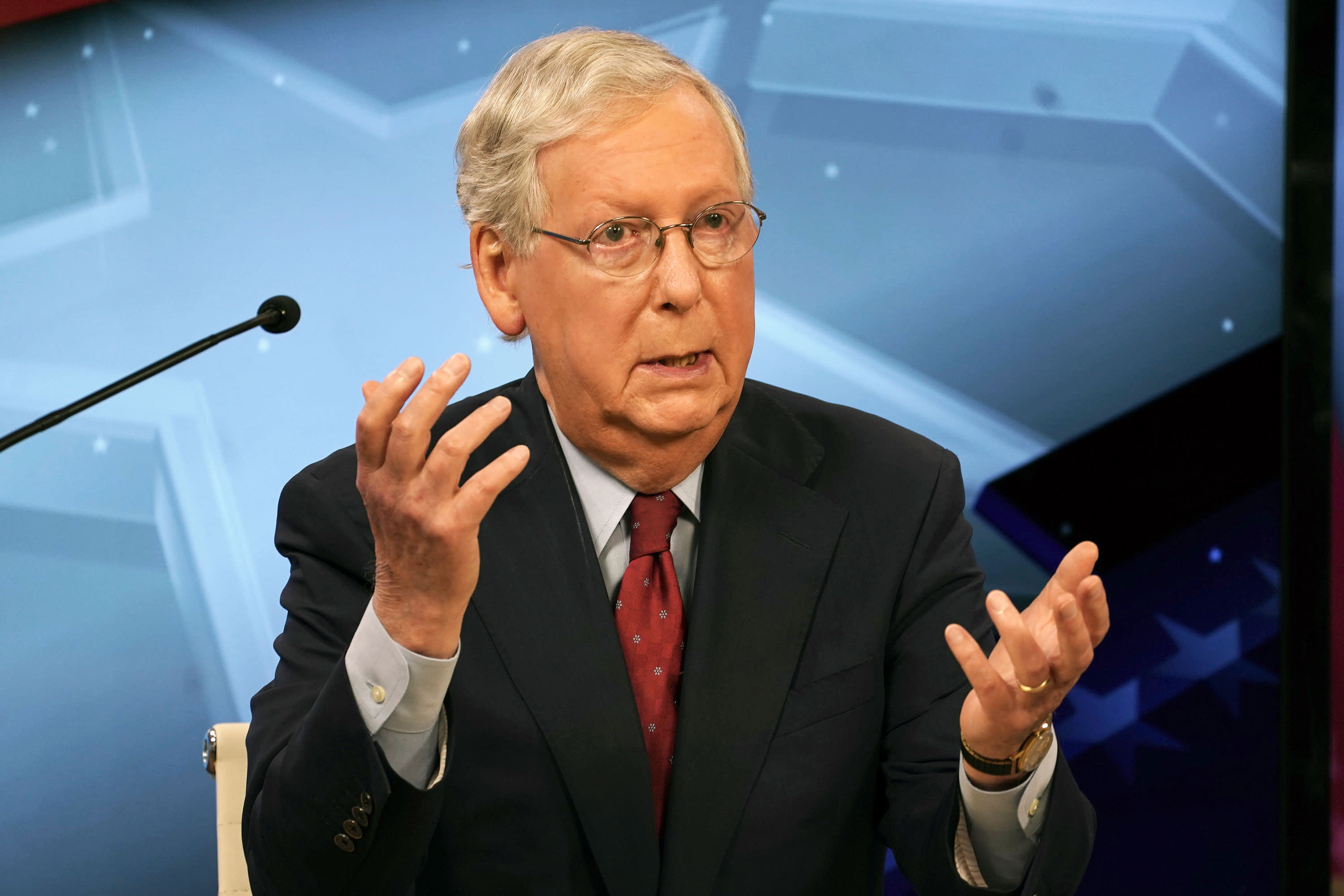
Senate Majority Leader Mitch McConnell (R-KY) speaks with Democratic challenger Amy McGrath during a debate on October 12, 2020 in Lexington, Kentucky.
Michael Clubb | Pool | Getty Images
The Senate will vote on a limited coronavirus stimulus bill this month, Majority Leader Mitch McConnell said Tuesday, as lawmakers stumble in their push to send aid to Americans before the 2020 election.
In a statement, the Kentucky Republican said the Senate would take up aid legislation after the full chamber returns on Oct. 19. McConnell called the plan “targeted relief for American workers, including new funding” for Paycheck Protection Program small business loans. Speaking at an event in Kentucky, he said the bill would also include money for schools, an unemployment insurance boost and liability protections for businesses.
McConnell said in his statement that the Senate would have enough time to both pass the relief proposal and confirm Supreme Court nominee Amy Coney Barrett “unless Democrats block this aid for workers.” Democrats have in recent days targeted Republicans for moving forward with Barrett’s nomination while millions of Americans left jobless by the virus outbreak await federal assistance.
Democrats, who blocked a roughly $500 billion Republican plan in the Senate last month, could dismiss the latest GOP proposal as inadequate. A spokesman for Senate Minority Leader Chuck Schumer did not immediately respond to a request to comment on whether Democrats would support the new Republican bill.
McConnell announced plans for a vote as hopes for new spending to boost the health-care system and economy dim. Democrats and the Trump administration have failed to strike a relief deal as the U.S. creeps closer to Election Day on Nov. 3. Meanwhile, the White House and Senate Republicans appear more out of sync than ever on what the federal response will require.
“STIMULUS! Go big or go home!!!” President Donald Trump tweeted Tuesday shortly after McConnell detailed plans to vote on narrow legislation.
Over the weekend, Treasury Secretary Steven Mnuchin offered House Speaker Nancy Pelosi a roughly $1.8 trillion plan — about $400 billion less than the bill House Democrats passed earlier this month. Pelosi has dismissed the proposal, and on Tuesday suggested Trump “only wants his name on a check to go out before Election Day and for the [stock] market to go up.”
“Over 215,000 Americans have died, nearly 7.8 million have been infected and millions more are still without jobs or income security and therefore struggling to make rent and put food on the table,” she wrote to House Democrats. “Tragically, the Trump proposal falls significantly short of what this pandemic and deep recession demand.”
Pelosi for months has pushed for comprehensive legislation rather than stand-alone bills to address specific relief provisions. A White House spokesman did not immediately respond to a request to comment on Pelosi’s criticism.
The latest offer from Mnuchin includes $300 billion in aid for state and local governments, $400 per week in enhanced unemployment insurance into January, direct payments of up to $1,200 for adults and $1,000 per child and liability protections for businesses, among other details reported by NBC News. Among the key differences with the House plan, Democrats have called for more than $400 billion in state and municipal relief, $600 per week in supplemental jobless benefits and no lawsuit protections for businesses.
Pelosi’s letter to Democrats on Tuesday included statements from House committee chairs criticizing what they called inadequacies of the White House plan. They cited state and local aid, Covid-19 testing, tax credits, rental assistance, protections for workers, child care, support for elections systems and the U.S. Census.
McConnell will set up another vote on relief as Senate Republicans fight to keep their 53-47 majority. The party will defend 23 seats this year, and several Democratic challengers have announced staggering fundraising figures as polling averages show tight contests in key races.
Democrats will have to flip three GOP-held seats to gain Senate control if Democratic presidential nominee Joe Biden wins the White House, or four if Trump does.




